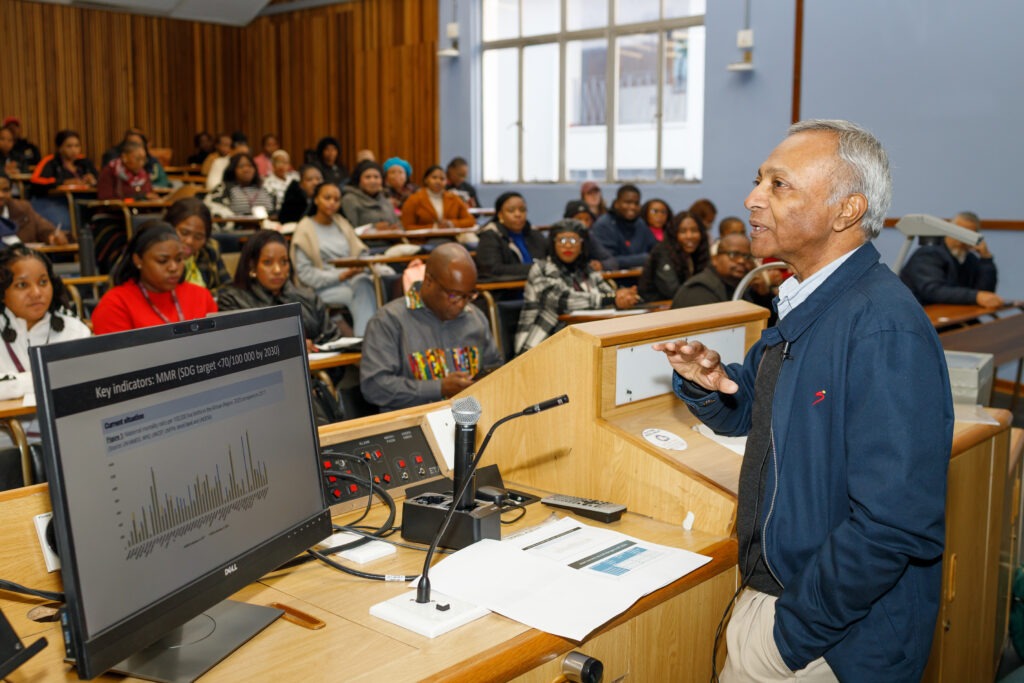
Prof Yogan Pillay delivering his keynote address titled: Resourcing and sustainability challenges for inclusive and equitable health management in Africa at our PgDip Winter School.
The healthcare situation in South Africa – and indeed the rest of the African continent – is looking extremely challenging for the near future. Professor Yogan Pillay, Director of HIV and TB Delivery at the Gates Foundation, made this crystal clear in his keynote address at the Africa Centre for Inclusive Health Management’s 2025 PgDip Winter School on 28 July 2025.
Incidences of non-communicable diseases are rising in SA, and the country’s HIV/AIDS infection rate remains the highest in the world. TB also continues to claim lives, especially among HIV-positive individuals, many of whom ultimately die from tuberculosis. On top of this, the healthcare system is strained by poor infrastructure, quality of care, and access to medical facilities, and stark disparities between public and private services.

If he had one takeout for all healthcare administrators, systems managers and professionals in the field, it would be to prioritise. “Going forward, we need more efficiency in everything,” Prof Pillay stressed. Considering that global healthcare funding for Africa is declining, planning and designing healthcare treatment and prevention interventions are more important than ever.
Global funds are running low
Prof Pillay pointed out that international support to African countries is decreasing annually, from $80 billion in 2021 to around $49 billion, with a forecasted $36 billion by 2030.
But it’s not all bleak. Valuable lessons can be drawn from countries like Malawi. After cuts to Aids funding, the Malawian government managed to reorganise services by reallocating local resources to maintain HIV programmes, redeploying healthcare workers, and partnering with NGOs to continue supporting Aids response efforts.
Focus on adherence and prevention
One of the first focus areas, said Prof Pillay, should be antiretroviral medication, particularly ensuring that patients stick to their treatment plans. Data suggests that up to one-third of HIV positive people don’t take recommended doses, placing an additional burden on hospitals when they fall ill.
On the prevention front, awareness around pre-exposure prophylaxis (PrEP) – which helps prevent HIV infection – must increase. PrEP uptake in South Africa remains very low. “Communities have a big role to play to bring home the message that this medication saves lives.”
Prof Pillay did share some good news, such as the fact that statistics show the number of people living with HIV will decline in the future. He added that research is also progressing on antiretrovirals that are easier to take and could be administered via injections, making both access and adherence more manageable.
Getting as much data as possible
“For health system managers, I would say get as much data as possible, about your patients, their community, the prevalence of diseases, the state of water supply and sanitation, the demographics; as much information as possible in that community.”
In short, funding is shrinking, while demand for healthcare is rising, often due to preventable conditions linked to poor lifestyle choices, such as unhealthy diets, alcohol use, smoking, and lack of exercise. While there is government support, greater involvement from the private sector is necessary.

Communities also need to know what the government will fund and plan accordingly. South Africa must urgently increase access to, and the quality of, public healthcare while driving uptake of preventative services.
“We need a productive workforce to grow our economy,” Professor Pillay concluded. “But to have productive people, you need healthy individuals.”
Professor Yogan Pillay is Director for HIV & TB Delivery at the Gates Foundation. With over three decades of experience in global and national health systems, he formerly served as South Africa’s Deputy Director-General of Health, overseeing HIV, TB, maternal and child health, and universal health coverage. He delivered the keynote address at the Africa Centre for Inclusive Health Management’s 2025 PgDip Winter School on resourcing and sustainability for inclusive and equitable health systems.
